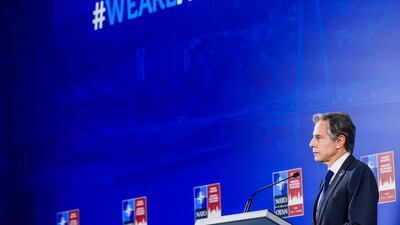US Secretary of State Antony Blinken said on Wednesday that Washington had seen evidence Russia could be planning an invasion of Ukraine, and threatened Moscow with painful economic sanctions if it attacks.
"We're deeply concerned by evidence that Russia has made plans for significant aggressive moves against Ukraine. Plans include efforts to destabilise Ukraine from within as well as large-scale military operations," Mr Blinken said after a meeting of Nato foreign ministers in Latvia's capital Riga.
He accused Moscow of massing "tens of thousands of additional combat forces" near the border.
Mr Blinken did not say what the evidence consisted of.
"Now, we don't know whether President Putin has made the decision to invade," he said. "We do know that he's putting in place the capacity to do so on short order, should he so decide."
Mr Blinken said that "diplomacy is the only responsible way to resolve this potential crisis" before a meeting with Russian counterpart Sergey Lavrov in Sweden on Thursday.
But he gave a warning that there would be "far-reaching and long-lasting consequences" for Moscow if it pushed ahead with any aggression.
He said the US would impose “high-impact economic measures that we’ve refrained from using in the past” if Russia invaded its neighbour.
"We made it clear to the Kremlin that we will respond resolutely," Mr Blinken said.
He also said that Nato allies were "making sure that Ukraine has the means to defend itself", and that the alliance would "look at what it needs to do in the event of further Russian aggression, to shore up its own defences".
On Tuesday, Mr Blinken gave a warning that any Russian aggression in Ukraine would trigger "serious consequences". He said movements on Ukraine's eastern border were unusual and that any escalation would be of "great concern to the United States".
Moscow, which seized Crimea from Ukraine in 2014 and backs separatists fighting Kiev, has strongly denied it is plotting an attack and blames Nato for fuelling tensions.
Russian President Vladimir Putin accused Nato of menacing Russia. He demanded “legally binding” security guarantees that would keep Nato weapons out of Ukraine.
“The threat on our Western frontier is really growing,” Mr Putin said at the Kremlin earlier Wednesday. “For us, this is more than serious.”
Asked about Mr Putin’s remarks, Mr Blinken said that the notion that Ukraine poses a threat to Russia “would be a bad joke if things weren’t so serious”.
The back-and-forth comments made clear that tensions only continue to escalate between the former Cold War foes, even as both insist they want to ease them.
Moscow on Wednesday accused Ukraine of massing tens of thousands of troops in the country's east, as worries grow over an escalation.
Also on Wednesday, Ukrainian President Volodymyr Zelensky called for direct talks with Moscow.
Earlier, Ukraine asked Nato for a “deterrence package” to bolster its defences against Russia.
Ukrainian Foreign Minister Dmytro Kuleba said additional military support was needed to defend his nation against the threat of Moscow.
Mr Kuleba called for a three-pronged approach involving clear communications with the Kremlin, preparing a package of sanctions and increasing military support for Kiev.
"We are confident that if we join efforts, if we act in a co-ordinated fashion, we will be able to deter President Putin and to demotivate him from choosing the worst-case scenario, which is a military operation," Mr Kuleba said.
After the meeting in Riga, Nato Secretary General Jens Stoltenberg warned Russia that it would face a "high price" if it launched an operation against Ukraine and said alliance members could impose sanctions. Nato itself does not decide on sanctions.

